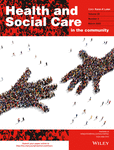Surviving versus living life: Capabilities and service use among adults with mental health problems and histories of homelessness
Funding information
Financial support for this study was provided to the lead author by Mental Health Research Canada (MHRC). The MHRC did not have any role in the development of the study, analysis or interpretation of the data, or in the preparation of the manuscript.
Abstract
The capabilities approach is a framework that can be applied to marginalised populations, including people with mental health problems and histories of homelessness, to measure well-being. Although a range of health and social services exist to address the many challenges associated with mental health problems and homelessness, the extent to which these services impact capabilities is unknown. This qualitative study explored the perspectives of people with mental health problems and histories of homelessness to understand how they perceived their service use as affecting their capabilities. In-depth interviews were conducted over a 1-year period beginning in October 2016 with 52 adults with mental health problems who were currently or formerly homeless and living in Ottawa, Canada. Data were analysed using first and second cycle coding, which involved line-by-line, descriptive coding followed by focused coding to categorise the data within a broadly applied capabilities framework. Findings showed that participants perceived many capability impairments in their lives, including nutritious food scarcities, limited material rights, social role deprivations, social isolation and insufficient income to participate in recreational activities. Services used by participants had mixed, for better and worse, and limited effects on their capabilities (e.g., unable to overcome affordable housing shortages or financial barriers associated with some capability impairments). Furthermore, service use could promote one capability while hindering another, forcing people to choose between competing needs when using services. Overall, the capabilities approach offers a comprehensive, human rights-based framework that is relevant to people with mental health problems and histories of homelessness but the services used by this population primarily help people to survive life but not necessarily live life.
CONFLICT OF INTEREST
No conflicts of interest have been declared.




